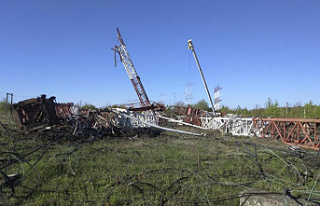Trans-Dniester has not seen fighting since 1992, when a separatist war ended.
However, Russians' war in Ukraine may have been escalated by explosions that occurred in the last two days. Around 1,500 Russian troops are already stationed in Trans-Dniester. A potential outbreak of hostilities could pose a serious threat to Moldova, one the poorest European countries.
What is TRANS-DNIESTER?
Trans-Dniester stretches approximately 400 km (249 mi) between the border of Ukraine and Moldova on the eastern bank. The majority of the 470,000 people living in this region speak Russian, but many residents identify as Russian, Ukrainian, or Moldovan.
Trans-Dniester was alarmed by attempts to make Moldovan Moldova's 1989 official language, while it was still part of the Soviet Union. In 1990, the region declared independence and fighting broke out. The fighting escalated in March 1992, and continued until a July ceasefire. More than 700 people were killed in the conflict.
A contingent of Russian troops was allowed to remain in Trans-Dniester under the cease-fire agreement as nominal peacekeepers. The region insists it is not part Moldova since 1991 when Moldova declared independence.
Trans-Dniester still uses many Soviet iconography and ways of life, such as the hammer-and-sickle flag. It has been peaceful and tourists enjoy the anachronisms.
WHAT HAPPENED THIS WEEK?
On Monday, explosions rocked the regional headquarters of the state security ministry. According to reports, the building was unoccupied due to Orthodox Easter holidays. No casualties were reported. Officials claimed that the rocket-propelled bombs used in the attack were used. Local media showed what looked like firing tubes on a street.
Two powerful antennas were taken out of service by explosions at a broadcasting station on Tuesday morning. The attacks were not claimed to be the responsibility of anyone.
Trans-Dniester President Vadim Krasnoselsky called Tuesday for anti-terrorist security measures to be imposed at a "red" level for 15 days. This includes the installation of blockposts at city entrances.
The United States warned that Russia could use "false flag" attacks to attack nearby countries as a pretext for sending troops into the country during the conflict in Ukraine.
ARE THERE ANY RUSSIAN ABBITIONS IN THE REGION
Russia doesn't recognize Trans-Dniester independent like it does other breakaway regions such as South Ossetia or Abkhazia.
These areas were either recognized by Russia or Georgia after they fought in a war in 2008, or to justify Moscow's invasion of Ukraine in February. A flurry of fighting in Trans-Dniester may change the Kremlin’s political calculus. Russia's security policy says it has the right and obligation to protect the rights of ethnic Russians around the globe.
Rustam Minnkayev, a senior Russian military officer, stated last week that Russian forces were looking to seize control of the southern Ukraine. He also said that such a move would open up a land corridor between Russia, Trans-Dniester, and Russia.
To achieve this military objective, significant battles would be required to capture Ukraine's Black Sea coast and Odesa, the main port city. Russian soldiers will undoubtedly encounter tremendous resistance.
Russia has logistical problems. They must solve the problem Odesa if they want to start a military operation in Trans-Dniester to create a corridor to Trans-Dniester," Anatol Taranu, a Moldovan analyst, said to The Associated Press.
Trans-Dniester's Russian contingent is primarily focused on protecting ammunition and warehouses. Its fitness for combat is not known. Trans-Dniester also boasts approximately 10,000 soldiers.
Moldova is constitutionally neutral so Russia cannot use the country that wants to join NATO to justify invasion. This is what Vladimir Putin did with Ukraine. However, Russia would have a presence in Moldova if it expanded to NATO member Romania.
Taranu stated that Trans-Dniester is not sensible strategically.
He said that there was a political logic to Russia's failure of taking control of Kyiv, Ukraine's capital. This is in light both the fierce resistance by Ukrainian forces and Russia's failure.
Taranu stated that Putin must tell the public a success story. He noted that Putin may be looking to make a claim on Victory Day in Russia, which is the major secular holiday.












